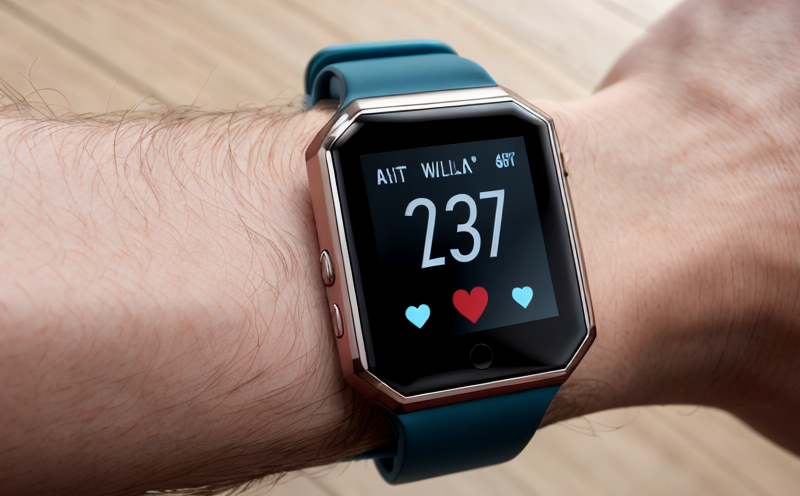ISO 10993-5 In Vitro Cytotoxicity Testing for Skin Contact Wearables
The ISO 10993-5 standard is a critical component of medical device testing, focusing on the evaluation of cytotoxic effects of materials used in contact with skin. This test assesses whether the material can induce harmful reactions when it comes into direct contact with human skin, which is particularly important for wearable devices such as smartwatches, fitness trackers, and other digital health products.
The procedure involves placing a sample of the device on cultured cell lines to observe if there are any adverse effects. The cytotoxicity test aims to ensure that the material is safe for extended contact with skin without causing irritation or toxicity. Compliance with this standard is essential for manufacturers looking to obtain regulatory approval and market their products in Europe, where the European Union's Medical Device Regulation (EU MDR) mandates adherence to ISO 10993-5.
This testing procedure covers a wide range of materials used in wearable devices, including plastics, metals, textiles, and any other components that may come into direct contact with skin. The test is performed using two methods: the current measurement method or the colorimetric method, both aiming to detect any toxic effects on the cells.
One of the key aspects of this testing process is specimen preparation. It involves carefully preparing the sample in a way that mimics real-world conditions as closely as possible. This includes ensuring the sample is representative of the actual product and that it can be exposed to the same environmental factors, such as humidity and temperature variations, which might affect its performance.
The instrumentation used for this test is sophisticated and highly specialized, designed to provide accurate and consistent results. The testing apparatus typically includes incubators, microscopes, and automated systems capable of monitoring cell viability over time. The use of these advanced tools ensures that the test results are reliable and reproducible, which is crucial for regulatory compliance.
The acceptance criteria for ISO 10993-5 are stringent and designed to protect public health. A cytotoxicity test is considered successful if no adverse effects are observed on the cell lines used in the test. If toxic effects are detected, further investigation may be required to determine their nature and extent.
Given the importance of this testing for wearable devices that come into direct contact with skin, it is essential to choose a laboratory that can provide accurate, reliable, and consistent results. Our team at Eurolab is equipped with the necessary expertise and facilities to perform ISO 10993-5 cytotoxicity tests in accordance with international standards.
Our laboratories are fully accredited by internationally recognized bodies, ensuring that our testing meets the highest quality standards. We use cutting-edge technology and follow rigorous protocols to ensure accurate results every time. Our team of experienced scientists and engineers is committed to providing comprehensive support throughout the entire testing process, from specimen preparation to final report generation.
By choosing Eurolab for your ISO 10993-5 cytotoxicity testing needs, you can be confident that your products will meet the strictest regulatory requirements. Our services are designed to help you navigate the complexities of medical device regulation and ensure a smooth path to market approval.
Benefits
- Ensures compliance with EU MDR regulations for wearable devices coming into contact with skin.
- Provides accurate, reliable, and consistent results that can be used to support regulatory submissions.
- Facilitates the development of safe products by identifying potential cytotoxic effects early in the design process.
- Saves time and costs associated with retesting due to failed compliance checks.
- Enhances your product's reputation for safety and quality, improving market acceptance.
Eurolab Advantages
At Eurolab, we pride ourselves on providing top-tier service that goes above and beyond industry expectations. Our team of experts is committed to delivering accurate, reliable, and consistent results for every project. We offer a range of services tailored to meet the specific needs of our clients, ensuring that you receive the support you need throughout the entire testing process.
Our laboratories are fully accredited by internationally recognized bodies, including ISO/IEC 17025, ensuring that all tests conducted within our facilities meet the highest quality standards. This accreditation guarantees that our results are valid and can be trusted for regulatory submissions.
We use cutting-edge technology and follow rigorous protocols to ensure accurate and consistent results every time. Our team of experienced scientists and engineers is dedicated to providing comprehensive support, from specimen preparation to final report generation. We understand the importance of timely delivery and strive to meet all deadlines without compromising on quality.
Whether you need help with a single test or require ongoing support throughout your product development process, Eurolab is here to assist you every step of the way. Our commitment to excellence ensures that you receive the best possible service and results for your project.
Use Cases and Application Examples
| Use Case | Description |
|---|---|
| Skin Contact Wearables Testing | Cytotoxicity testing for smartwatches, fitness trackers, and other devices that come into direct contact with the skin. |
| Regulatory Compliance | Ensuring compliance with EU MDR regulations by conducting cytotoxicity tests in accordance with ISO 10993-5 standards. |
| Product Safety Assessment | Evaluating the safety of new materials and designs for wearable devices to ensure they do not cause harmful reactions when used by consumers. |
| R&D Support | Providing data that can be used during the research and development phase to identify potential issues early on and make necessary adjustments to the design or material composition. |
| Quality Assurance | Conducting regular testing throughout the production process to ensure consistency in product quality and safety. |
| Post-Market Surveillance | Monitoring products after they have been placed on the market to detect any potential issues that may arise due to prolonged use or exposure. |





